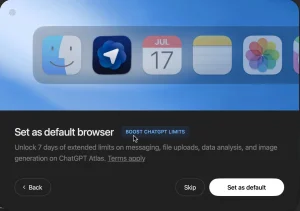OpenAI has introduced ChatGPT Atlas, a new AI-powered browser designed to merge intelligent conversation with everyday web use. Announced on October 21, 2025, Atlas marks OpenAI’s most ambitious move beyond chat, aiming to transform how users explore, learn, and act online.
Built on the Chromium engine, the same foundation used by Chrome and Edge, ChatGPT Atlas blends standard browsing functions with conversational AI. It is currently available for macOS, with Windows and mobile versions coming soon.
Inside the ChatGPT Atlas Experience
Atlas reimagines what a browser can do by making ChatGPT part of every page. A sidebar interface lets users chat with the model while browsing. Users can summarise articles, compare information, or find deeper insights without switching tabs.
A standout feature is Agent Mode, which allows the AI to take action on behalf of users. From planning trips and booking tickets to completing online forms, the agent performs multi-step tasks autonomously.
Atlas also introduces memory integration, enabling the browser to recall past pages, preferences, and projects. This feature allows ChatGPT to anticipate user needs and build on previous sessions, creating a seamless, personalised experience.
Other innovations include split-screen browsing and inline editing, where users can view pages and chat responses side by side, or edit text fields directly with AI suggestions.
A Direct Challenge to Traditional Search
With Atlas, OpenAI is positioning itself as a serious challenger to Google Chrome’s dominance. Instead of the usual “search and click” model, users can now “ask and act”, relying on the AI to not only find answers but complete actions.
This could reshape how information is discovered, how ads are delivered, and how online productivity works. Atlas represents OpenAI’s clearest attempt to move ChatGPT from a passive assistant to an active internet companion.
Perks for Early Users
ChatGPT Atlas supports Chromium-based extensions, allowing users to install many of their favourite Chrome add-ons directly within the browser. This compatibility makes it easy to transition from Chrome or Edge without losing essential tools like Grammarly or Notion Web Clipper.
While OpenAI has not announced any official promotion, some early users on Reddit have reported seeing temporary perks (such as increased chat limits or trial features) after setting Atlas as their default browser. These reports remain unconfirmed, but they highlight OpenAI’s potential interest in rewarding early adoption.
The Privacy and Adoption Hurdles
Despite its promise, Atlas faces key challenges. Users are already raising questions about privacy, data storage, and how browsing information is used to improve AI models. Managing transparency and control will be crucial.
There’s also the issue of adoption. Convincing users to move from Chrome or Safari will not be easy, especially with entrenched habits and established ecosystems. OpenAI’s success may depend on how quickly it rolls out cross-platform support and developer tools.
Significance for Emerging Markets
For regions like Nigeria and other parts of Africa, Atlas could open access to advanced AI-driven browsing tools that simplify research, business, and learning. However, connectivity and data costs remain potential barriers. The platform’s real value will depend on how well it adapts to local content and contexts.
A Glimpse Into the Future
ChatGPT Atlas is a vision of an AI-first internet. By combining browsing, search, and intelligent action into one interface, OpenAI is setting the stage for a new era where the web feels more conversational, responsive, and personal.
If Atlas succeeds, it could change how we browse by turning every click into a dialogue and every task into collaboration between human and machine.

















